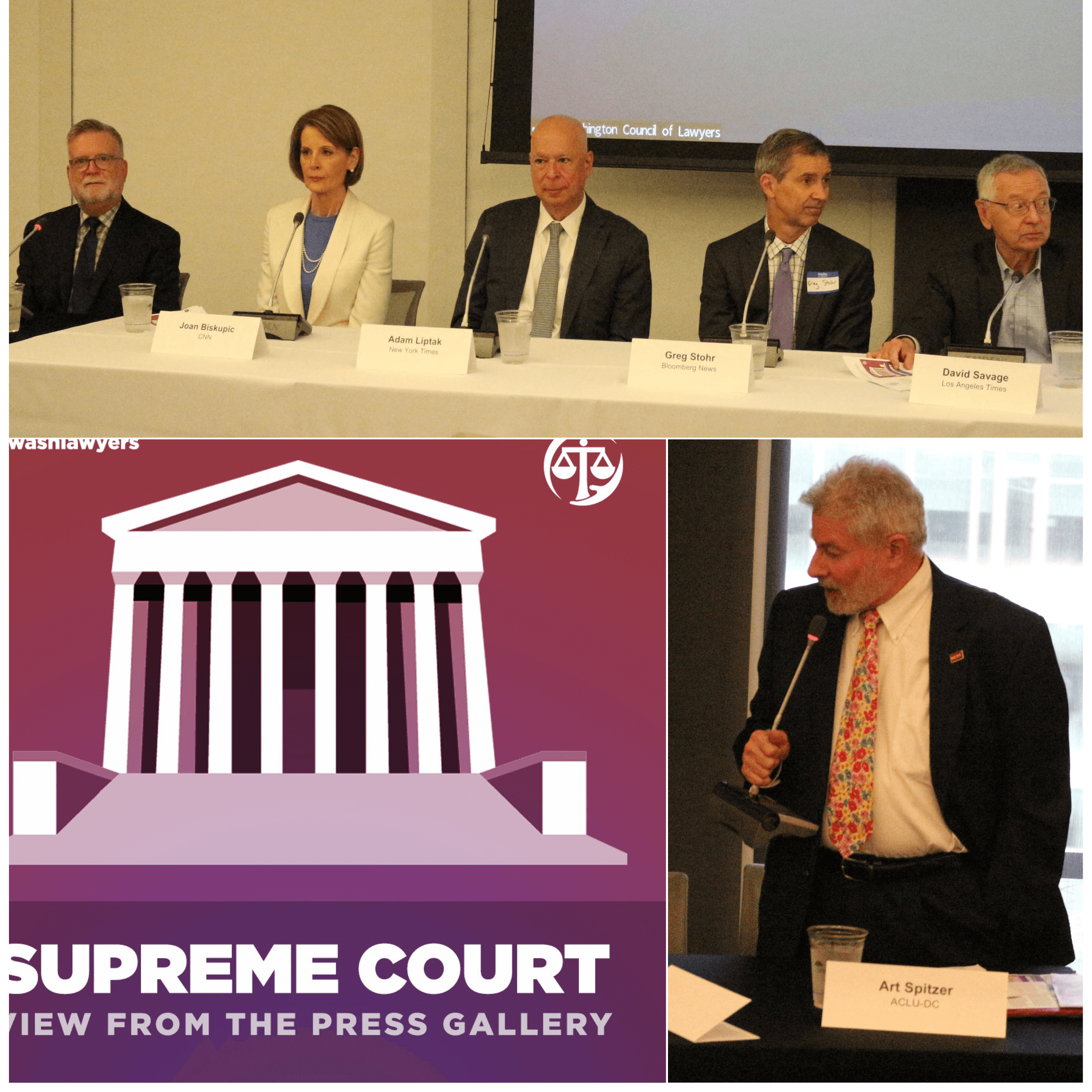
Supreme Court: View from the Press Gallery Recap
By Ethan Cornell
On Tuesday, July 11th, we welcomed lawyers, interns, and law students to our 35th annual “Supreme Court: View from the Press Gallery” event. This event peels back the curtain on the recently concluded Supreme Court term through the eyes of the journalists who have covered the court for decades. We were excited to welcome everyone back in person for the first time since 2019!
After introductions, the seminar began with the effects of the pandemic on the court and the reporting process. The structure of the Court’s arguments changed throughout the pandemic but our panelists disagreed on the long term benefits of those changes. Many of the arguments were initially only made in the courtroom and in-person attendance was necessary to hear them. To Stohr, the ambiance in the courtroom is very important, but Savage believes it was more comfort at home, listening to a recording. Savage said the new model has helped him to hear the arguments more clearly and understand them in a comfortable environment.
The panel switched gears and discussed the newest addition to the Supreme Court, Justice Jackson, and how her presence has affected the dynamics within the court. Barnes noted Justice Jackson’s background as a trial court judge and how she is a very actively asks questions during arguments. Barnes also noted how she is very outspoken in her view of the Constitution through her statements and opinions. The rest of the panel was in agreement with Justice Jackson’s vocality when it comes to expressing dissent towards other Justices and as well as certain amendments, such as the 14th. Justice Jackson will continue to make her mark as someone that thoroughly reads and writes about these cases, and is not afraid to have differing opinions than her fellow Justices.
Joan Biskupik touched on her newest book, “Nine Back Robes: Inside the Supreme Court’s Drive to the Right and Its Historic Consequences.” She described it as more of a group portrait of the Justices rather than a biography of just one like she has done in the past. Her book analyzes the overall process of the leave of Justice Kennedy and President Trump’s nominations essentially led to a right-heavy court. She opens up the world of the Supreme Court to help readers understand the consequences of a right leaning court with an urgency to address these impacts.
Our panel then dove into the daily responsibilities of a journalist for the Supreme Court. Liptak mentioned how reading the briefs of the Justices is a key part of the job when it comes to day-to-day duties and some of these briefs can be extremely lengthy and thorough. Barnes mentioned that there were some days when he would come into the office to work on a recent case and by the end of the day, realized that he has not spoken to anyone because of all the required reading. Stohr talked about the conversations that he has had with different lawyers that involve his writing and the different possibilities that can come out of cases and decisions. This can play a very important part jobs and helps them tremendously get a grasp of the information being thrown at them. The demand for reading quickly and regurgitating information promptly whenever possible is an essential component of this job, especially in a world where information is at the tip of our fingers through technology.
Another topic discussed by the panel was ethics, including their personal expense reports and extensions on them, the prevalence of former law clerks arguing before the Court, and the rise of Justices speaking or appearing at politically affiliated events. Receiving extensions on disclosure for different trips and visits that these Justices take has been more present. For example, Justice Alito requests personal expense report extensions without viable explanations as to why. Spitzer then mentioned how former law clerks often argue before the Court and how this may raise issues considering the personal relationships Justices form with their clerks. Biskupic noted that these Supreme Court clerks are in high demand from law firms, because they have personal insight into how these Justices think and where exactly they are coming from with certain issues, which can be a massive advantage to have at a firm. The final ethics issue the panel discussed was the way the Justices have affiliated themselves with political groups. Savage illustrated this point with examples of the relationships that some of the conservative Justices have with the Federalist Society or even Justice Thomas and Justice Barrett speaking with Mitch McConnell publicly.
The panel was then turned to the crowd to answer a couple of questions from some fellow members of the audience. One member of the audience asked about the leaked Dobbs decision and how the press handled the leak and the subsequent investigation. Barnes quotes that this leak and the later findings that this was a real document was a “shock to the system” especially to the dynamics between the Justices and as well as the rest of the Court. He states that this “frayed the relationships” amongst one another. Stohr follows Barnes and gives a personal story mentioning his wife, Kimberly Atkins Stohr regarding this event. Being that they are both journalists, Stohr mentions that when this story came out, they immediately went to their respective desks in their house and wrote for the rest of the night without speaking to each other, which speaks to the significance and urgency of not only this story, but the role of a journalist when covering the Supreme Court.
Ethan Cornell is the 2023 Summer Intern at Washington Council of Lawyers






